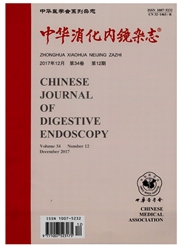

 中文摘要:
中文摘要:
目的评价胃镜下幽门环肌切开术治疗先天性肥厚性幽门狭窄的近期效果和安全性。方法采用超细电子胃镜治疗12例先天性肥厚性幽门狭窄患儿,男8例,女4例,平均年龄(57.5±14.4)d,使用乳头肌切开刀和针式切开刀沿幽门至胃窦方向切割幽门管环肌。结果12例患儿共行13次胃镜下治疗。11例术后1~10d内呕吐停止;其中1例首次治疗后35d复发呕吐,2次内镜治疗后第10天停止。另1例术后未止呕,后诊断为巨细胞病毒性肝炎行药物治疗而完全缓解。本组除1例治疗后出现少量黑便外,未见其他并发症。结论胃镜下幽门环肌切开术治疗先天性肥厚性幽门狭窄近期有效率高、安全。
 英文摘要:
英文摘要:
Objective To evaluate the short-term effect and safety of endoscopic pyloromyotomy for congenital hypertrophic pyloric stenosis(CHPS). Methods Twelve infants, including 8 boys and 4 girls, mean age (57.5±14.4)days, who were diagnosed as CHPS, underwent endoscopic pyloromyotomy by using an ultra-thin gastroscope. Incisions were made from the duodenal to the antral side of the pylorus by an endo-scopic electrosurgical sphincterome or a needle knife. Results These 12 patients underwent 13 endoscopic operations. Vomiting ceased in 1-10 days in 11 cases, of which one patient's vomiting was recurrent 35 days after the first procedure, which was improved 10 days later after another endoscopic operations. Another one did not stop vomiting because of cytomegalovirus hepatitis, whose symptoms were relieved after secondary treatment. No complications were observed except for minor melena in one case after the therapy. Conclusion Endoscopicall pyloromyotomy in CHPS is effective and safe in short-term follow-up.
 同期刊论文项目
同期刊论文项目
 同项目期刊论文
同项目期刊论文
 期刊信息
期刊信息
